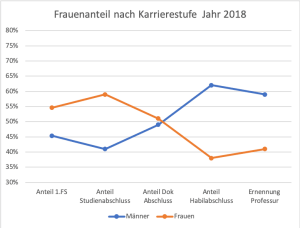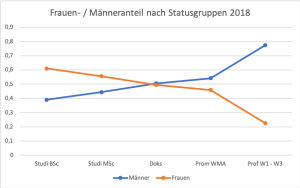
Fair language
"Women are included..." is a common justification for using the masculine form for simplicity in the german language. Unfortunately, women are not necessarily included then - as research shows time and again. The following article about female researchers from the FjordExternal link is particularly striking evidence of this. By using the masculine form, non-binary persons are not included, they remain invisible.
Furthermore, you will find some background information and assistance in the complete collection of links on fair language.
The Friedrich Schiller University Jena is therefore committed to fair language. We recommend the following two guidelines in particular:
- Guidelinepdf, 348 kb · de: "Fair in the matter - Fair in the language" by the Vice President's Office for Young Academics and Equality for the use of gender-sensitive german language at Friedrich Schiller University Jena.
- GuidelineExternal link: "Sag's doch GLEICH!" by the Thüringer Kompetenznetzwerk Gleichstellung for gender-sensitive german language at Thuringian universities.
- GuidelineExternal link: "Non-Binary Gender in Language" - How can we be linguistically inclusive of people with non-binary gender in german language? How do I greet my audience when giving a talk? How does it work with pronouns? A fact sheet from the website nonbinary.ch.
Copying and sharing is explicitly encouraged.
Fair representation
"Men are bosses, women are assistants" - such images are reinforced by media portrayals. They are effective, for example, in print media, on the Internet, but also in public relations work of universities. Therefore, it is important to be aware of gender bias in media portrayal and to avoid biased portrayals as much as possible. Not mentioning non-binary persons also contributes to an erroneous representation.
The following research provides multiple examples of this:
- Professional articleExternal link: "Female Librarians and Male Computer Programmers? Gender Bias in Occupational Images on Digital Media Platforms."
- Professional articleExternal link: "It’s All about the Parents: Inequality Transmission across Three Generations in Sweden."
- Professional article:External link "Persons of Nonbinary Gender — Awareness, Visibility, and Health Disparities"
Friedrich Schiller University Jena wants to increase the visibility of women with the portrait series Women in Science. de In addition, with the project "Sprechen wir über Gendergerechtigkeit" (Let's talk about gender justice), the Equal Opportunities Office draws attention to women from all areas of the university and discusses current gender-related topics.
For a more in-depth interest, you can find more background information on fair representation here.
Liniendiagramm zum Frauenanteil nach Karrierestufen in der FSU, 2018
Image: Anke HildebrandtFair participation
The proportion of women continues to decline along the career ladder. This is also still the case at Friedrich Schiller University of Jena. Therefore, it is actively and intensively striving to increase the proportion of women through a variety of measures and thus to increase equal opportunities for all members of the university. The attainment of qualification and career levels was significantly more fairly distributed in 2018. However, previous data collections focused exclusively on the binary gender system, i.e., female and male. Globally, there is currently a large data gap on the participation of non-binary individuals, for example in the university context.
The graphic on the right illustrates the figures from the Gender Monitor 2018. (Source of figures: Friedrich Schiller University of Jena, Vice-President for Young Researchers and Diversity Management )
Click on graphic to enlarge.
Liniendiagramm zu Statusgruppen der FSU 2018
Image: Anke HildebrandtFriedrich Schiller University Jena is actively and intensively striving to increase the proportion of women and these measures can contribute to increasing equal opportunities. The attainment of qualification and career levels was significantly more fairly distributed in 2018, i.e. the status groups themselves.
(Source of figures: Friedrich Schiller University of Jena, Vice-President for Young Researchers and Diversity Management )
Click on graphic to enlarge.
Fair participation in the Covid-19 pandemic
Male dominance in society was and is clearly visible in the Corona pandemic. While the issue of equality is often misunderstood as a luxury problem, it is in fact inseparably entangled with the causes of the crisis.
After alarming findings about the intensification of structural discrimination against women scientists and women of other status groups since the beginning of the Corona pandemic, there are now already surveys and studies from which equality-oriented action is needed.
Some studies and articles on the subject can be found at fair participation.
Fair evaluation
"Women are soft, men are hard" - this and many common notions often based on it we also apply today towards the genders in many areas of life. Non-binary people are especially vulnerable to unfair judgments. This usually happens unconsciously. Especially on a professional level, we thus contribute through our judgment and behavior to solidifying the existing differences in the professional opportunities of men and women.
Studies show that many of our unconscious conclusions are shaped by our experience rather than ratio. Unfortunately, fair role distributions are still not part of everyday life (see above Fair participation) and therefore not part of our world of experience. Systematically, therefore, women's performance is evaluated worse than men's. Persons who belong to several marginalized groups, i.e. who are exposed to different forms of discrimination at the same time, are the more affected.
Conclusive argumentation is the cornerstone of scientific self-understanding. Are we as scientists always free of unfounded prejudices? Bias is as much a part of human nature as the ability to think logically, says Nobel Prize winner Daniel Kahneman in Schnelles Denken Langsames DenkenExternal link (published in German by Randomhouse, 2016).
Carrying unconscious biases within oneself is quite normal. If we become aware of these biases in the various areas of life, we can counteract them in a meaningful way.
For this you will find some studies on fair evaluation.
Fair language
- Forscherinnen von der Förde – genannt oder »mitgemeint«?External link
- Richtlinien und Checkliste der UNESCOExternal link
- Genderwörterbuch "Geschickt Gendern"External link
- Sprachleitfaden _Sag’s doch GLEICH_This link requires a loginde
- Sprachleitfaden _Fair in der Sache – Fair in der Sprache_This link requires a loginde
Fair representation
- Gender Bias in Occupational Images on Digital Media PlatformsExternal link
- Inequality Transmission across Three Generations in SwedenExternal link
- Medien und StereotypenExternal link
- Theoretische Perspektiven auf mediale GeschlechterbilderExternal link
- Global Media Monitoring Project 2015 - EuropeExternal link
- Geschlechterkonstruktionen von Spitzenpersonal in der BildberichterstattungExternal link
- „Kluge“ Köpfe – „dumme“ Körper?External link
- Women are seen more than heard in online newspapersExternal link
Fair evaluation
- Exposing Gender Bias in Student Ratings of TeachingExternal link
- Committees with implicit biases promote fewer women when they do not believe gender bias existsExternal link
- The Paradox of Meritocracy in OrganizationsExternal link
- How stereotypes impair women’s careers in scienceExternal link
- The Role of Gender in Scholarly AuthorshipExternal link
- Scientific excellence and equal opportunitiesExternal linkde
- What the gender pay gap ignoresExternal linkde
- Women are Credited Less in Science than are MenExternal link

